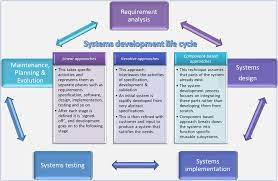Unlocking Efficiency and Innovation with System Development Software
The Importance of System Development Software
System development software plays a crucial role in the creation, maintenance, and enhancement of various software systems. It encompasses a range of tools and processes that facilitate the design, implementation, testing, and deployment of software applications.
Key Components of System Development Software
System development software typically includes integrated development environments (IDEs), version control systems, testing frameworks, and deployment tools. These components work together to streamline the software development lifecycle and ensure the delivery of high-quality products.
Benefits of Using System Development Software
By leveraging system development software, organizations can achieve several benefits:
- Efficiency: System development software automates repetitive tasks and provides developers with tools to increase productivity.
- Collaboration: Version control systems enable multiple developers to work on the same codebase simultaneously without conflicts.
- Quality Assurance: Testing frameworks help identify bugs and errors early in the development process, ensuring a more robust final product.
- Scalability: System development software supports the scalability of software systems by providing tools for modular design and efficient code management.
- Speed to Market: By streamlining the development process, system development software helps organizations bring new products and features to market faster.
The Future of System Development Software
As technology continues to evolve rapidly, system development software is also advancing to meet the changing needs of developers and organizations. Emerging trends such as low-code platforms, artificial intelligence integration, and cloud-based development environments are shaping the future of system development software.
In conclusion, system development software is a critical enabler for organizations looking to innovate and stay competitive in today’s digital landscape. By investing in the right tools and processes, businesses can accelerate their software development initiatives and deliver value to their customers more effectively.
5 Essential Tips for Effective System Development Software
- Plan and document your system requirements thoroughly before starting development.
- Use version control to track changes and collaborate with team members effectively.
- Follow best practices for coding standards and design patterns to ensure maintainability.
- Perform regular testing, including unit tests, integration tests, and user acceptance tests.
- Consider scalability and security aspects while designing and developing the system.
Plan and document your system requirements thoroughly before starting development.
It is essential to plan and document your system requirements thoroughly before embarking on the development process. By clearly defining the objectives, functionalities, and constraints of the system upfront, you set a solid foundation for the development team to work from. Comprehensive documentation helps ensure that all stakeholders have a shared understanding of the project scope and expectations, reducing the risk of misunderstandings or misalignment later in the process. This proactive approach not only enhances communication and collaboration but also minimizes rework and delays by providing a roadmap for efficient development efforts.
Use version control to track changes and collaborate with team members effectively.
Using version control is essential in system development software as it allows developers to track changes, manage code revisions, and collaborate seamlessly with team members. By utilizing version control systems such as Git or SVN, developers can maintain a history of modifications made to the codebase, revert to previous versions if needed, and merge changes from multiple contributors without conflicts. This practice not only enhances transparency and accountability within the development process but also ensures that the team can work together efficiently towards achieving project goals.
Follow best practices for coding standards and design patterns to ensure maintainability.
Following best practices for coding standards and design patterns is essential in system development software to ensure maintainability. By adhering to established guidelines and principles, developers can create code that is easier to understand, modify, and debug in the future. Consistent coding standards promote readability and consistency across the codebase, making it more manageable for multiple team members to collaborate effectively. Design patterns provide proven solutions to common software design problems, improving the overall structure and scalability of the system. Ultimately, prioritizing best practices in coding standards and design patterns leads to more maintainable software that can adapt to changing requirements with minimal effort.
Perform regular testing, including unit tests, integration tests, and user acceptance tests.
Performing regular testing, which includes conducting unit tests to validate individual components, integration tests to ensure proper interaction between modules, and user acceptance tests to confirm that the software meets end-user requirements, is essential in system development software. Testing at each stage of the development process helps identify and rectify issues early on, resulting in a more robust and reliable final product. By incorporating a comprehensive testing strategy, developers can enhance the quality of their software, improve user satisfaction, and ultimately contribute to the success of the project.
Consider scalability and security aspects while designing and developing the system.
When designing and developing a system, it is crucial to consider scalability and security aspects. Scalability ensures that the system can handle increased workload or user demands without compromising performance. By planning for scalability from the outset, developers can future-proof the system and avoid costly rework later on. Additionally, prioritizing security during the design phase helps mitigate potential vulnerabilities and protect sensitive data from threats. A proactive approach to addressing scalability and security concerns not only enhances the system’s reliability but also instills trust among users and stakeholders.




